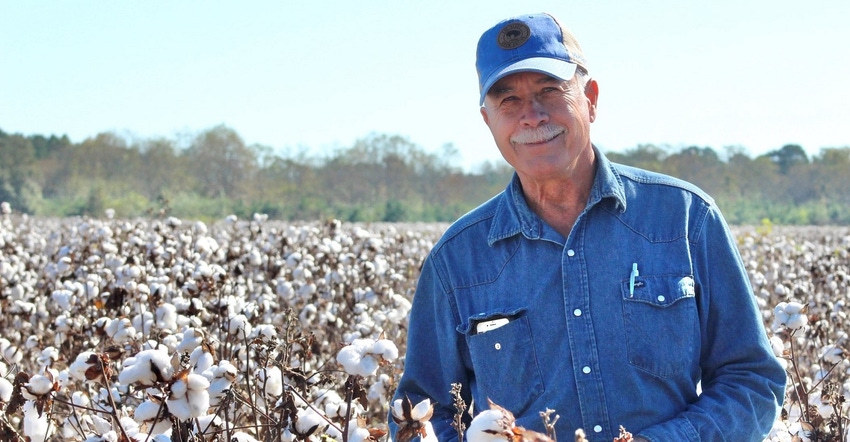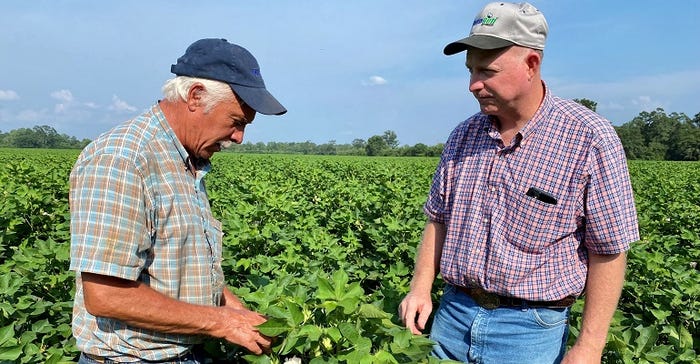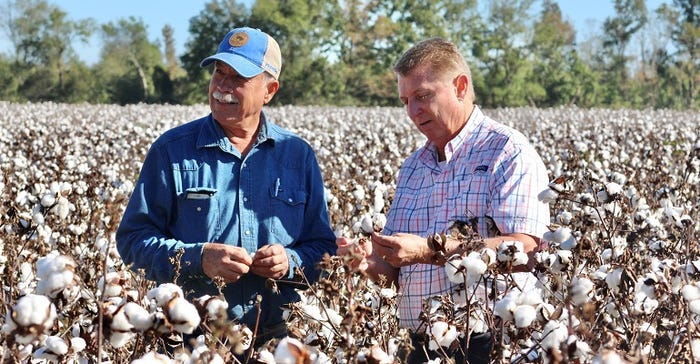January 5, 2022

Sponsored Content
It’s not every day that a single change solves so many problems.
Southeast producers have long-favored a cotton and peanut rotation, even with the age-old challenge of 2,4-Db applications drifting from peanuts into cotton. With the advent of dicamba-tolerant cotton, the problem compounded: You had to avoid both 2-4Db drift from peanuts into dicamba-tolerant cotton and dicamba from cotton into peanuts.
When Tommy Mathews heard there was a better herbicide system for his cotton-peanut rotation, it grabbed his attention. The Alabama producer saw an opportunity to simplify weed management with PhytoGen® W3FE varieties and the Enlist® weed control system in cotton.

“What I really like about these PhytoGen W3FE varieties is that you can use the same sprayer for your cotton and peanuts because you never have to put dicamba in your tank,” Mathews said. “It’s very difficult to get dicamba out of your sprayer, especially when you’re moving quickly from one field to the next, so eliminating dicamba applications is a big deal when you’re in a cotton-peanut rotation.”
PhytoGen W3FE varieties have built-in tolerance to three herbicides — 2,4-D choline, glufosinate (Liberty® herbicide) and glyphosate. That means producers can utilize Enlist herbicides, which have a new formulation of 2,4-D designed to land and stay on target. Mathews said that gives him better weed control with fewer headaches, especially moving from peanuts into cotton.
“The 2,4-Db that we spray in our peanuts can solidify in the lines of your sprayer. If a flake breaks off while you're spraying dicamba cotton, it will wrinkle up the leaves and can hurt your cotton,” Mathews said. “But that doesn’t happen with the PhytoGen W3FE varieties. I am excited to come out here and see the cotton looking beautiful all season long, even when they’re growing next to peanuts. You can’t beat that.”
Mathews’ biggest problem weed is glyphosate-resistant Palmer amaranth, and he said Enlist herbicides “work as well as anything I’ve ever sprayed — they do a number on the pigweeds.”
Yielding the proof and profits
While the herbicide system initially piqued Mathews’ interest, the yield potential kept him coming back for more. In 2020, Mathews worked with PhytoGen Cotton Development Specialist Russell Nuti to plant a PhytoGen experimental variety with resistance to reniform nematodes. The experimental variety yielded 1,300 pounds per acre on dryland, with the top competitive variety on his farm only bringing 750 pounds.
That was enough to move Mathews to 100% PhytoGen brand varieties on his cotton acres, with most fields in 2021 going to PhytoGen brand PHY 443 W3FE.
“The PhytoGen varieties are producing better yields with fewer upfront costs,” Mathews said. “I’m 100% dryland and I have really bad reniform nematodes. Before these newer varieties, I had to use starter fertilizer and other inputs to get the crop up. That’s an extra $70 to $80 in the crop before I even know what the weather is going to do. If I can eliminate those costs and get a higher yield, that really helps my bottom line.”

Mathews also contributes higher yields to better seedling vigor and varieties with more consistent performance in good and bad seasons.
“PhytoGen varieties come up fast and look beautiful within a month, while the competition is struggling with five leaves on the plant. We need seedlings that come up and stick a taproot down deep, because that’s how they get moisture when it turns off dry,” Mathews said.
Preliminary Extension data confirm what Mathews saw on his farm. In the 2021 Auburn University trials at the Tennessee Valley Research and Extension Center, PHY 443 W3FE was the highest yielding variety in the full-season dryland trial, producing 1,649 pounds/A.1
As Mathews wraps up harvest and looks to 2022, he’ll again plant PhytoGen W3FE varieties for consistent performance, better weed control and higher yields.
“I’m absolutely going to plant PhytoGen varieties again next year,” Mathews said. “I’ve been farming my whole life and I have some fields that never looked as good as they did the last two years. PhytoGen always had good varieties, but these new varieties are even better. More consistent — made for the way we farm in the Southeast.”
To get more information on PhytoGen W3FE varieties bred for the Southeast, go to PhytoGen.com/facts.
1Auburn University, Tennessee Valley Research and Extension Center, Full Season Non-Irrigated trial, 2021.
™ ® Enlist, Enlist Duo, Enlist One, PhytoGen, the PhytoGen Logo and Vydate are trademarks of Corteva Agriscience and its affiliated companies. ® Liberty is a registered trademark of BASF. Vydate® C-LV and Vydate L are Restricted Use Pesticides. The Enlist® weed control system is owned and developed by Corteva Agriscience LLC. Enlist Duo® and Enlist One® herbicides are not registered for sale or use in all states or counties. Contact your state pesticide regulatory agency to determine if a product is registered for sale or use in your area. Enlist Duo and Enlist One herbicides are the only 2,4-D products authorized for use with Enlist crops. Consult Enlist herbicide labels for weed species controlled. Vydate C-LV and Vydate L are not registered for sale or use in all states. Contact your state pesticide regulatory agency to determine if a product is registered for sale or use in your state. Always read and follow label directions. © 2021 Corteva.
About the Author(s)
You May Also Like




